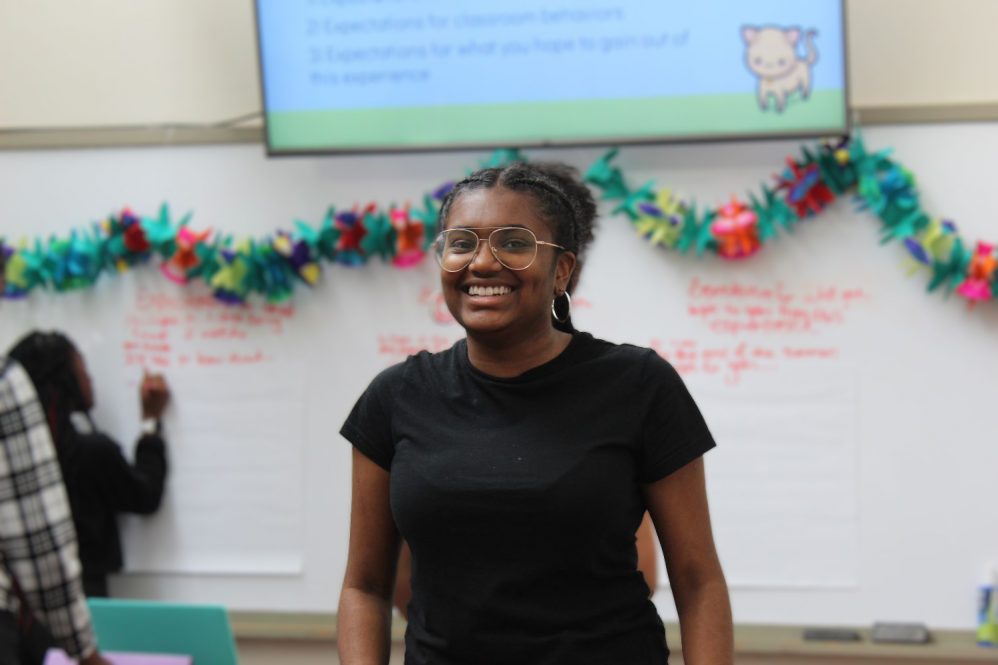This summer, Jasmine Morris ’23 (CAHNR) is working with students in the Horizons Program at The Ethel Walker School in Simsbury to teach them about animal science and support their socioemotional learning.
Horizons is a national program that supports underserved elementary and middle school students through programming that promotes educational equity. The program at The Ethel Walker School serves students who attend Hartford public schools.
Morris, originally from East Hartford, Connecticut, has been volunteering with Horizons at The Ethel Walker School, the first all-girls Horizons program, for seven years.
The summer after her sophomore year, Morris returned to volunteering with the program, which had not run in-person since 2019 due to the COVID-19 pandemic. She observed that many students were having a hard time adjusting to being back in the classroom.
“These kids needed an outlet for what they’re feeling,” Morris says.
Morris thought back to her own time in middle school where she had the opportunity to benefit from the Youth Ambassador K-9 Program, a program that taught students about the field of working dogs. Morris remembers having therapy dogs there while the teachers talked to her and her classmates after the shooting at Sandy Hook Elementary School in 2012 and the Boston Marathon bombing in 2013.
“For me it was really about thinking back to my own experience and what helped me,” Morris says. “Even though I didn’t understand why at the time, I knew I felt better since the dog was there.”
Morris wanted to harness the therapeutic power of animals for this generation of students.
With support from a UConn IDEA Grant, Morris gives students hands-on experience with animals and teaches them about the field of animal science.
Morris’ lessons highlight traditional and less well-known aspects of animal science, including guest speakers such as zoologists, researchers, animal food sales representatives, veterinarians, and wildlife rehabilitators.
Morris says she hopes to inspire these students to consider studying animal science and pursuing a career in the field.
“The field is so big,” Morris says. “That’s something I want to share with them.”
Since kindergarten, Morris knew she wanted to work with animals. But at the time she thought the only way she could do that was by being a veterinarian.
“UConn Animal Science has opened my eyes to how vast the field of animal science was,” Morris says. “It wasn’t until I attended UConn that I was truly able to appreciate how broad animal science can be.”
Morris’ lessons take place three times a week, with information about animal care that makes connections with socioemotional learning. For example, students learn how to approach animals safely while also having a discussion about reading human body language.
“All my lessons are centered around giving them access to things they wouldn’t get during their normal school experience,” Morris says.
As part of the project, students from Horizons had the opportunity to visit the Storrs campus, see the facilities, and get a peek into what life could be like for an animal science major.
Through UConn’s animal science program Morris was able to learn about animal-assisted therapy and is minoring in therapeutic horsemanship education.
Morris wants to continue this kind of work after graduating, planning to continue her education to earn a Master of Social Work focusing on human-animal interactions. She credits several supporters for their help guiding her towards this project: her project advisor and Neag associate professor Tamika La Salle, Rev. Augustus Sealy who helped inspire Morris and motivated her to apply for this project, and Linda Blick, her long-time mentor. She is also a recipient of The Dobrowolsky Family Day of Pride Scholarship.
Follow UConn CAHNR on social media.



